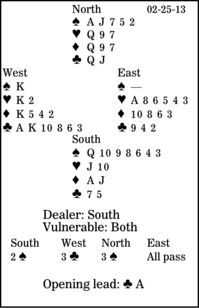Bridge column, February 25: Partner can help to guide the defense

At the bridge table, defenders have gotten much smarter over the last couple of decades, letting their partners be their guide instead of guessing.
In this example deal, how should West plan the defense against three spades after he leads the club ace: jack, two, five?
Since South was vulnerable, had a relatively weak suit and 7-2-2-2 distribution, he opened with two spades, not three. No doubt North should have jumped to four spades, but that would have ruined the story.
West needs to find five tricks. There are two logical ways to procure them: East has the heart ace and the defenders can take two clubs, two hearts and the spade king, promoted as a winner on the third round of hearts. Or East has ace-jack-third of diamonds, giving East-West two clubs and three diamonds. But how does West know which way to turn?
Under the club king, East can play his nine or his four. Each can be used to send a suit-preference signal. Here, because East has the heart ace, in the higher-ranking of the other two side suits, he plays his club nine. Then West will know to cash his heart king and continue with his second heart. East will win with his ace and play a third heart, letting West score his spade king.
Watch out for employing "useless" cards for suit-preference signals when attitude and count are either known or irrelevant.
** ** **
COPYRIGHT: 2013, UNITED FEATURE SYNDICATE
DISTRIBUTED BY UNIVERSAL UCLICK FOR UFS

